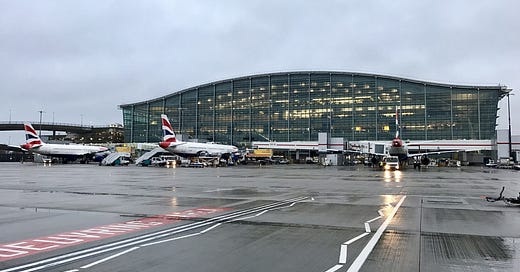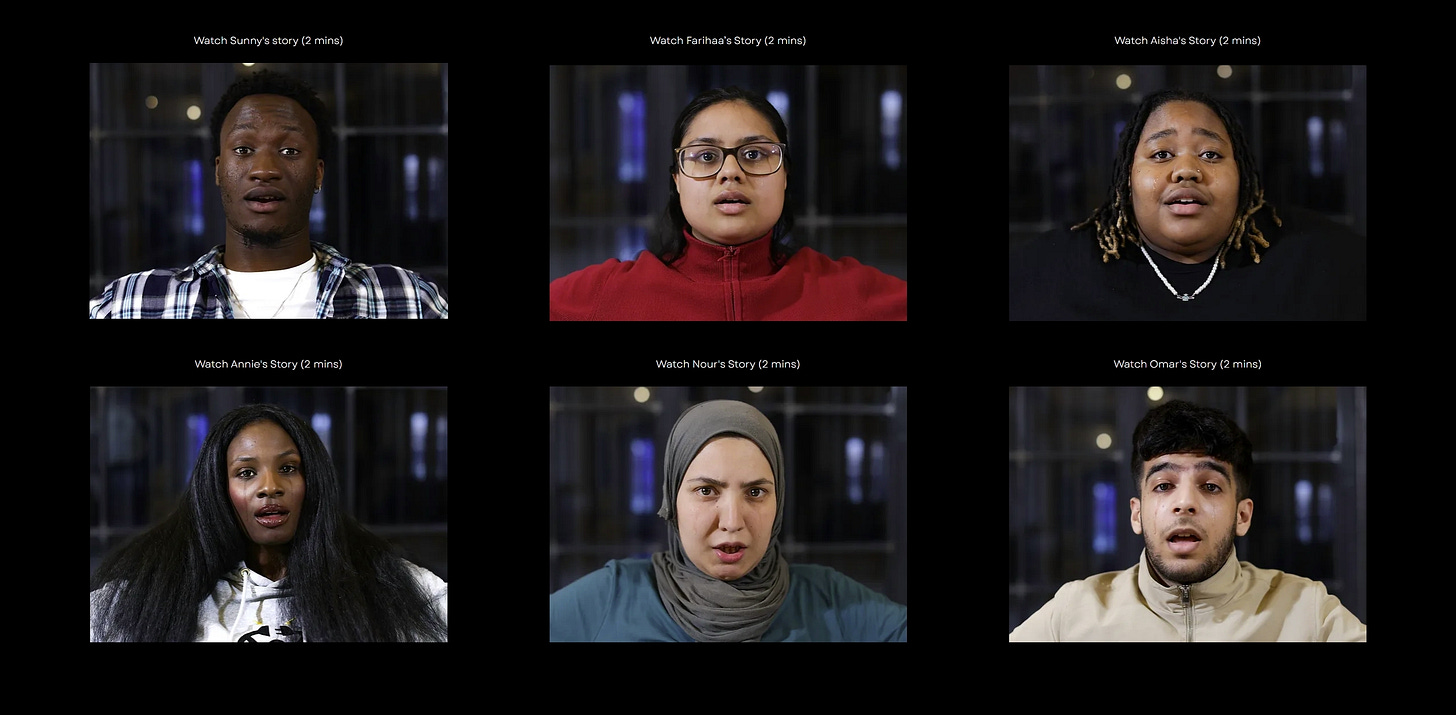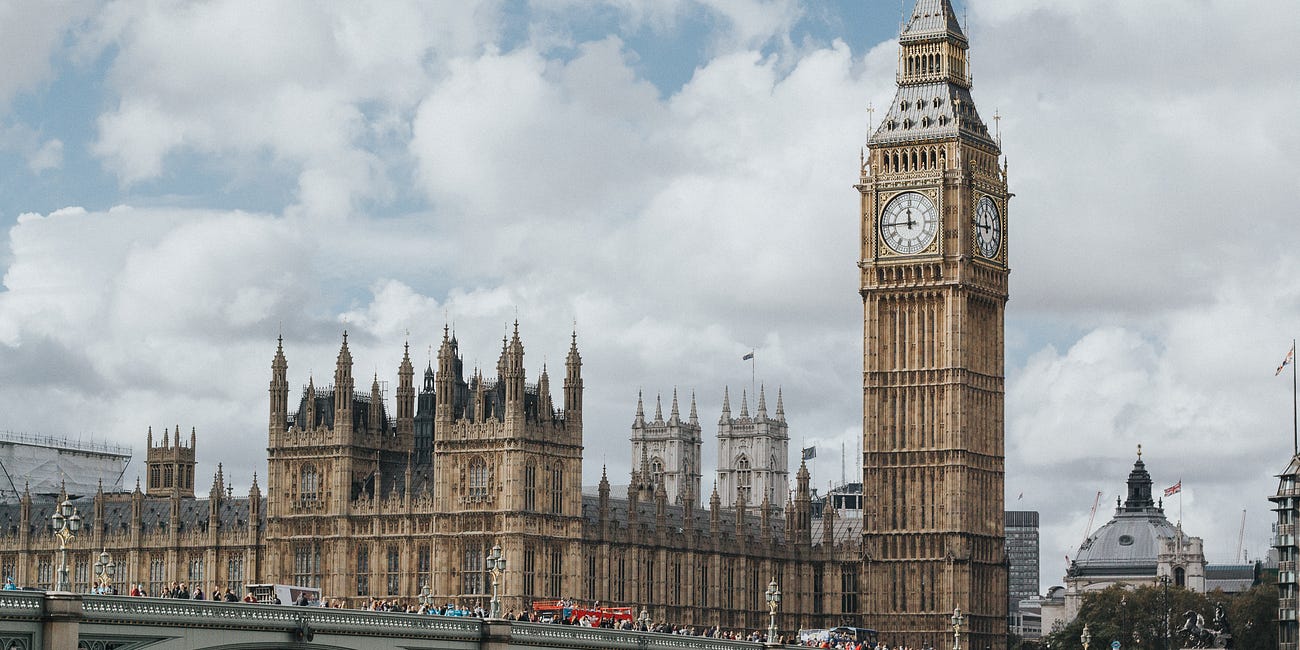Those Who Want to Go: A Voluntary Repatriation from Britain
If they want to leave we should help them!
In our previous piece covering the United States, we examined the data from a Monmouth University study which showed that some 45% of the non-Whites in the country would relocate abroad if they had the “resources and opportunity” to do so. We also covered a PEW research poll which showed that 26% of Asians in the United States would relocate if given the opportunity, and we delved into what this would mean for the future demographics of the country.
Since then we have discovered a similar poll that studied the non-White population’s desire to leave the United Kingdom.
The marketing organization Word on the Curb conducted a survey of over 1,600 non-White people aged 16 to 34 in the United Kingdom and found that some 66% of them were considering or actively planning to leave the country. The poll also covered the various reasons that these individuals want to relocate away from the island nation and included video interviews where the minority youths in question stated where they were looking to relocate.
59% of the non-White youth who stated they wanted to leave the United Kingdom cited a worsening quality of life, while 28% were dissatisfied with the government, and 44% believed they could garner better wages abroad. Interestingly, slightly less than 20% of those surveyed cited a perception of racial discrimination as a motivating factor, though 39% stated that Britain suffered from “bad vibes”. These “bad vibes” were reiterated several times in the video interviews.
Watching the seven video interviews provided by the Word on the Curb research team showed a diverse range of sentiments and motivations. Several interviewees stated that they had traveled abroad, usually to their ethnic homeland, and preferred the slower pace of life there. Other interviewees complained that Western society was simply too high pressure for them, while still others blamed competition with White youths for their various anxieties.
Additionally, six of the seven interviewees stated where they intended to or would like to relocate and in each case, they cited a non-White country.
Several were looking to relocate to Ghana, Sierra Leone, or South Africa. Others were thinking of teaching English in the United Arab Emirates while some were less specific, only citing a wish to relocate “somewhere” in the Middle East or Africa.
It is not unusual for non-Whites to pine after their ethnic homelands in this manner, nor is it abnormal for them to retain a desire to interact with their native societies. Diane Abbott, a rather famous Labour Party politician who served as deputy to the now-fallen Jeremy Corbyn, regularly penned columns in Jamaican newspapers. Abbott has appeared on Jamaican television and Jamaican government officials have publicly defended Diane Abbott against British politicians.
While Diane Abbott or David Lammy (the UK’s new openly anti-White Foreign Secretary) may not express a wish to leave the United Kingdom it is not surprising that younger non-Whites do. Being trapped between cultures is often bad for the mental health of minority individuals, regardless of how well they or their parents have integrated.
Native British opinion on the matter:
It is worth reiterating in some detail that large numbers of the native (White) British are greatly displeased with the Great Replacement.
According to a poll from the Police Institute of King’s College London, some 32% of the British are aware of the ongoing Great Replacement of Whites both in their own homeland and across the West. Only 29% of the British public are sure that the Great Replacement is “definitely” false/not occurring. This suggests that 70% or more of the British public are open to the idea, with a third already aware.
The We Were Never Asked Project also surveyed 2022 people on the streets of Britain, with 1002 being men and 1020 being women. The data revealed that most British people are not supportive of the Great Replacement with 68.5% of respondents viewing demographic change as a bad thing. Only 4.8% of respondents viewed demographic change as positive, and 26.3% had no strong feelings. This percent is, interestingly enough, nearly the same percentage as those who stated they do believe the Great Replacement is occurring in the King’s College Survey (29%).
Clear majorities of British men (74%) and British women (63%) view demographic change as bad. Similarly, a majority of Britons under 30 (52%) and above 30 (71%) view the displacement of the native British as negative. It is clear that there is a strong public interest in the demographic composition of the United Kingdom and therefore an interest in policy and political discussions to rectify the ongoing replacement of Whites in the United Kingdom.
It makes sense, therefore, for White countries, whose populations are desperate to reverse the trends of the Great Replacement, to assist these unhappy non-Whites with relocating abroad.
The effect of repatriation:
Such a repatriation may deprive the British economy of some £4.5 billion in consumer spending, but this repatriation will save the British taxpayer tens of billions of pounds each year.
To give an example: the NHS in England is spending some £45.6 billion a year on the non-White and overall non-British population. This represents some 28.5% of the NHS budget in England and roughly 33.28% of the country’s budget deficit for 2023.
In yet another example: In 2023 the budget for schools in England reached roughly £57.3 billion, with per capita funding reaching some £6,600 per pupil. These numbers are by far the highest on record and are expected to continue to increase as the costs of maintaining schools are expected to increase by some 7% in the next fiscal year.
Still, with a school-age population of roughly 8.4 million in 2021/2022 the British state is spending an incredible amount of money educating non-White non-British children. In the same 2021/2022 year White British pupils comprised only 64% of the school pupils in England, roughly 5.4 million White British children compared to some 3 million non-White and non-British children.
Applying the per capita rate of £6,600 per pupil would indicate that some £20 billion of the English education budget is being spent on non-White and non-British students. The native British are paying substantially in order to educate children who are not their own.
A Voluntary Repatriation Policy:
The data from Word on the Curb indicates that some 1.7 million of the 2.6 million people in the United Kingdom who fall into the category of non-White between the ages of 16 and 34 want to leave the country. If this group of 1.7 million people were to relocate abroad it would increase the native (White) British share of the UK school pupil population to some 80% or higher, especially if many children under 16 relocated with their families.
These individuals will require assistance in relocating as well. White Papers has long suggested that Britain offer a one-time relocation payment of some £31,285. A sum roughly double the annual income in the country.
To put this sum in perspective: it is equivalent to approximately 38 years’ worth of salary in Pakistan and India (regions where over 2.5 million residents of the United Kingdom have ethnic roots), 8 years’ worth of salary in the Caribbean, while in some African States the amount would equate to 80 years of earned income.
Assuming that all of the individuals who depart are British citizens (and they won’t all be) this policy would cost roughly £53 billion, or slightly more than the annual cost of providing NHS care to the entire non-White population in Britain. By assisting with voluntary repatriation the British taxpayer would save hundreds of billions of pounds in future spending, reducing future deficits and the national debt.
Combined with past White Papers’ policy proposals of steadily phasing out visa holders, denaturalizing criminals, and deporting dual citizens, the total number of repatriates and deportees from Britain could top some 7 million people. This figure represents a roughly 70% decline in the non-White population of Britain.
The population of Britain would fall from a current record high of 67.5 million to just about 60 million people. White Britons, who currently constitute 76% of the population, would rise to an 85% share. The White share of the population would increase from 83% to 92% and could be steadily increased through fertility rate correction.
The minority remnants would, overwhelmingly, be the 34% of non-Whites born in Britain who wish to remain in the country and a large portion of the roughly 1.3 million mixed White/non-White population. Though some of these persons may elect to leave Britain, and should be supported if they choose to do so.
Conclusion:
Britain will never be the same nation as before the Empire Windrush and the subsequent 80 years of mass immigration. The scar of the Great Replacement will forever mark the country and there is likely to be a permanent segment of the population which is non-White and larger in share than the historic average (which was about 1%).
But, through a detailed understanding of the current social environment, the policy options available, and the cost and savings involved in the process, Britons can begin to engage in a real conversation about what a viable repatriation and immigration system would look like.
The Great Replacement can reverse and being informed is the first step in making it happen.
White Papers is attempting to double our donor base this summer! Please Become a Paid Subscriber and Help Us Bring About the Needed Policy Changes:
Zelle: whitepapersinstitute@protonmail.com
Buy us a coffee: https://www.buymeacoffee.com/wppi
Linktree: https://linktr.ee/wppi
Snail Mail: White Papers Policy, PO Box 192, Hancock, MD 21750








The idea that there will always be a remnant non-White population is just a lack of vision. Once everyone who wants to leave has left (and been barred from ever returning, even for a brief visit) then it will be necessary to remove the remainder.
At the very least, should Britain foolishly allow them to stay, citizenship should be divided between voting citizens (ethnic English, Welsh, and Scots) and non-voting citizens (non-British, with standard rights and protections, but without the right to vote, serve on juries, the military or in sensitive areas of the economy, such as education, healthcare, banking or civil service). It goes without saying that miscegenation would needs be banned.
But a better solution would be to find the spirit that allowed Britain to build a worldwide empire, roll up your sleeves, and do the hard work of liberating the nation from the yoke of foreign occupation.